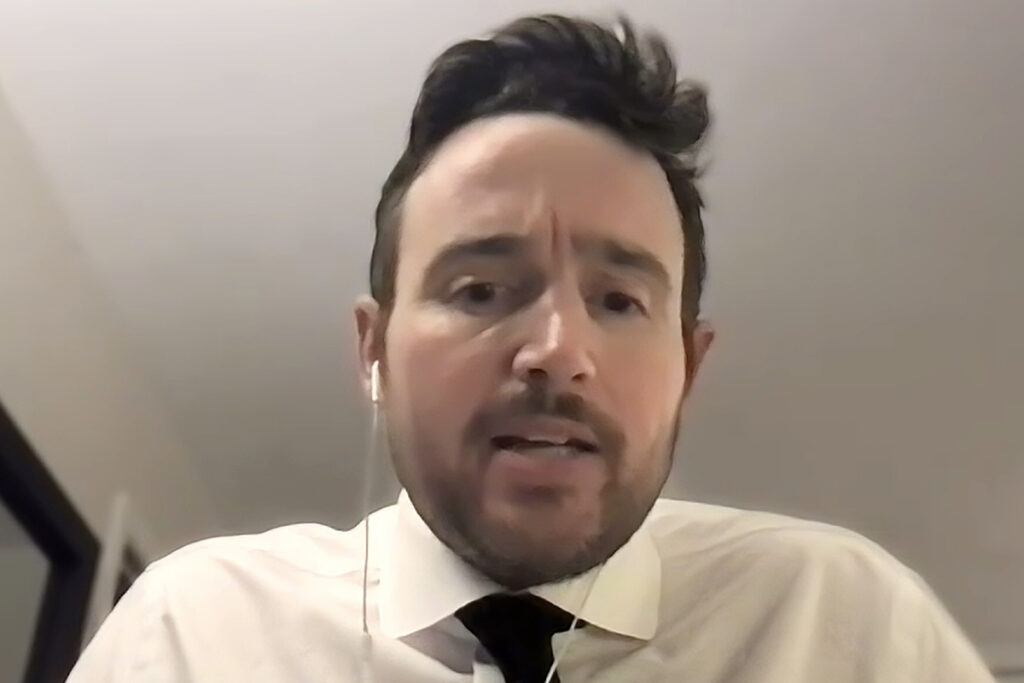Middle East Scholar Offers Ways to Talk About Conflict in EmersonTogether Series

How do we have constructive conversations about difficult and/or controversial topics when there seem to be so many perspectives and pitfalls?
Over the course of two talks on November 20 and 22, Dr. Peter Krause, an expert on Middle East politics and Israeli-Palestinian relations, gave some guidelines for how to begin those tough talks, along with a condensed but thorough history of the region and a selection of words or phrases that carry different, sometimes contradictory, meanings for Israelis and Palestinians.
Krause, an Associate Professor of Political Science at Boston College, and a research affiliate with the MIT Security Studies Program, was hosted by EmersonTogether, an initiative with the goal of affirming shared values within the College, creating opportunities for the community to engage with one another, and helping to build an inclusive culture at Emerson.
Krause offered six recommendations for holding constructive conversations on the Middle East:
Bring multiple perspectives into the conversation
It’s important to listen to different perspectives that people may have on the topic, Krause said. That doesn’t necessarily mean “both sides”-ing the conflict, or giving all viewpoints equal weight.
“Engaging with both sides does not mean concluding both sides every time,” he said. “You want to engage with multiple perspectives and histories and narratives, and then you can still decide which fact you believed or which narrative you believe about what happened.”
Call in, not out
When someone says something that you find offensive or hurtful, resist the urge to humiliate or attack them and try to “call them in,” Krause said, citing a phrase coined by activist and Smith College professor Loretta J. Ross.
“The idea of calling in [is] … not letting them off the hook, [but] saying, ‘This is why what you said to me is potentially problematic or offensive, let me explain to you why it landed on me this way, and maybe we can … use different language to have a more effective conversation.’”
Share pain. Don’t compare it.
Comparing pain, whether historical or personal, makes it very difficult for the person we’re disagreeing with to understand or hear us, because what we’re actually saying is that one event is more tragic or unjust than the other, Krause said. A more constructive way to communicate that pain would be to share why a term or a historical event matters so much to you or your family or your community.
“If we compare it, what we’re doing is minimizing someone’s pain … or, sometimes, if you look at it and say, ‘Oh, that’s much worse than what I experienced,’ then we minimize our own pain, and that’s also not good,” he said.
Words matter. A lot.
Krause spent much of the second talk explaining why a number of words or phrases related to the Israeli-Palestinian conflict (terrorism, intifada, genocide, antisemitism, anti-Zionism) may be defined, understood, or used differently, depending on which side is doing the speaking.
You may believe that your understanding of a word is the correct or original one, but there will usually be someone who is equally confident of their definition.
“That doesn’t mean that you have to necessarily change the words you use,” Krause said. “But if you’re trying to get across a certain motivation or goal or way that you feel to someone, recognize that sometimes the words that you use can actually be the source of that misinterpretation or difference of opinion, when in reality, you may support the same thing.”
If you do find yourself in conflict over a word or phrase, Krause suggests a four-pronged approach: discussing the word absent any present-day context, discussing the present-day context without using that particular word (describe what you mean), discussing the word and the context together; and using words of affirmation throughout.
Look to Learn, Not Win
Similar to engaging with multiple perspectives, aiming to learn from a conversation doesn’t mean that you abandon your position or stop advocating for policy changes you want to see, Krause said. What it means is that you go into a conversation prepared to ask genuine questions, to highlight areas of agreement as well as disagreement, and to debate an opponent’s strongest points rather than “strawman” their weakest ones.
“You’ll be amazed at how quickly you can connect with someone, you can learn from them – even people you disagree with – and you can get better at your advocacy, if that’s what you care the most about,” he said.
Recognize Power Dynamics
Power dynamics are always at play, and in the case of the Middle East, they can operate on multiple levels — not just the dynamics between Israel and Palestine, but power differentials between people engaging in conversation about the conflict, Krause said.
“I have been part of dialogues where the strong majority of people in the circle are very pro-Palestinian, or the strong majority… are very pro-Israel, and you would not be surprised to know that people who then don’t hold that view often clam up or don’t want to say anything that would offend someone or get them attacked by everybody else there,” he said.
Categories